The art of recovery with the use of nutrition is a hot topic for any budding athletes or an active person looking to gain a competitive edge.
 New research is emerging year-on-year highlighting the benefits of certain foods for enhanced performance and faster recovery. This is because, and as we’re beginning to see, it’s nutrition that makes the biggest difference in how you perform and recover.
New research is emerging year-on-year highlighting the benefits of certain foods for enhanced performance and faster recovery. This is because, and as we’re beginning to see, it’s nutrition that makes the biggest difference in how you perform and recover.
Recent studies have found that a planned scientific nutritional strategy (consisting of fluid, carbohydrate, sodium, and caffeine) compared with a self-chosen nutritional strategy helped non elite runners complete a marathon run faster. (I)
Exercise recovery is a complex process that takes into account more than just the repair of damaged muscles. Your brain, central nervous system, ligaments, joints, cartilage, and even your red blood cells need to repair after intense workouts (see how Iron increases blood levels).
Using specific foods at the right times allows you to shorten your recovery, increasing your strength, flexibility, endurance and lactate threshold. By the end of this article, you’ll learn which of my 11 favourite foods can improve how your body heals itself.
Table of Contents
The Importance of Foods for Recovery
Nutrition is vital for health and well-being, not only in recovery for sports performance. In fact, the foods you eat can even alter your DNA – preventing many illnesses from occurring.
In one study which tested how diet affected tumours did, in fact, show incredible changes to the rate of tumour growth – limiting its damaging effects on the body. (II)
 However, where sports nutrition is concerned, eating the right foods at the right times will increase not only your performance, but also your rate of recovery – limiting illnesses, injury, and fatigue.
However, where sports nutrition is concerned, eating the right foods at the right times will increase not only your performance, but also your rate of recovery – limiting illnesses, injury, and fatigue.
The combination of proteins, carbohydrates, fats, and caffeine (along with other minerals and micronutrients) will increase your mental performance, and sports performance. Ultimately, the correct sports nutrition plan will shorten your recovery between workouts.
Believe it or not, but eating the right foods when your body needs them can even promote fat loss. This is due to the way your body runs on a fine balance of hormone production. The more in-tune your body is (hormonally speaking) the easier it will be to lose body fat.
Below I’ve listed the most beneficial foods you can add to your diet for improved recovery.
11 Foods To Speed Up Recovery
(01) Beetroot
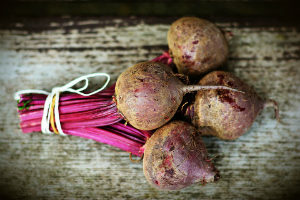 This amazing vegetable contains healthy amounts of nitric oxide which boosts oxygen supply to your muscles, along with healing nutrients which improves muscle contractions and recovery – improving oxygen utilization.
This amazing vegetable contains healthy amounts of nitric oxide which boosts oxygen supply to your muscles, along with healing nutrients which improves muscle contractions and recovery – improving oxygen utilization.
It’s common practice in some circles to use beetroot before a workout to boost the delivery of nutrients and oxygen into the working muscles. But the question I ask myself is, why limit it to a pre-workout snack?
Using beetroot post-workout will benefit you, as it will flush out waste products while assisting in the delivery of amino acids into your muscles, which increases muscle protein synthesis MPS.
(02) Cherries
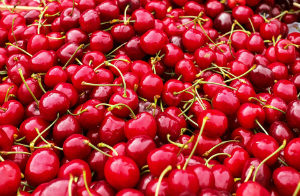 Eating cherries surrounding intense workouts can reduce muscle soreness. This means you can wave goodbye to your three days of delayed onset muscle soreness aches and pains. How is this possible?
Eating cherries surrounding intense workouts can reduce muscle soreness. This means you can wave goodbye to your three days of delayed onset muscle soreness aches and pains. How is this possible?
This is due to polyphenols which are high in antioxidants, more specifically, anthocyanins. These are found in cherries and other foods such as blackberries, plums, red apples and green tea. All of which will lower inflammation, improve brain function and speed up the recovery process.
Consuming unprocessed foods high in quality will enable you to reach your goals at a much quicker rate while limiting recovery time. Aim to consume both dark red fruits and vegetables for increased immunity and recovery.
(03) Dark leafy vegetables
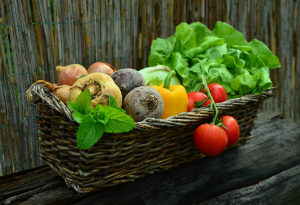 Eating vegetables is a no brainer, but l if you eat more dark leafy vegetable post-workout you’ll help to boost your iron intake along with your calcium, which increases bone strength and muscle repair.
Eating vegetables is a no brainer, but l if you eat more dark leafy vegetable post-workout you’ll help to boost your iron intake along with your calcium, which increases bone strength and muscle repair.
Iron from vegetables is classes as non-heme iron. To get the most out of iron’s benefits, make sure to consume with fruits high in vitamin C to increase its absorption into your body.
Not only will dark leafy vegetables improve muscle contractions and performance, but dark vegetables such as spinach contains magnesium. Magnesium (Mg) helps to increase nutrient absorption, relaxation, and some other 300 enzyme reactions that boost athletic performance and recovery.
(04) Protein
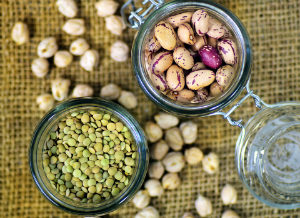 Proteins are made up of amino acids, and it’s these amino acids that build and repair your muscles. You’ll find proteins in animal and non-animal products.
Proteins are made up of amino acids, and it’s these amino acids that build and repair your muscles. You’ll find proteins in animal and non-animal products.
Still, to this day, health professionals haven’t come to a definite conclusion as to how much protein a person needs. But generally speaking, this will depend on age, activity levels, and current weight etc. The average is 0.8 grams of protein per kilogram of body weight.
Good sources of proteins are chickpeas, beans, chicken, eggs, tofu, beef, rice and whey protein.
(05) Caffeine and Carbohydrates
 Again, just like with protein, the macronutrient carbohydrate is vital for energy to our muscles, brain, and other organs in the body.
Again, just like with protein, the macronutrient carbohydrate is vital for energy to our muscles, brain, and other organs in the body.
Furthermore, it’s also been shown that when carbs are combined with caffeine, more specifically coffee – post-workout, it speeds up the rate at which your body replenishes its muscle glycogen stores – speeding up the recovery process.
It’s also been shown that when l-theanine (a similar stimulant to coffee) was used post-exercise it improved attention and memory skills after a cycling test. Read more on: L-Theanine: Improve Post Exercise Mental Alertness
Therefore, combining either coffee/l-theanine with carbohydrates after exercise not only increases muscle glycogen replenishment, but these tactics will also increase your mental alertness.
Read more on: Caffeine Post Exercise: Accelerate Your Recovery
(06) Green Tea
 Green tea is packed full of catechins, which has been shown to help reduce inflammation and oxidative stress (OS). It’s inflammation and oxidative stress that can cause damage to your central nervous system and muscular system if left unchecked.
Green tea is packed full of catechins, which has been shown to help reduce inflammation and oxidative stress (OS). It’s inflammation and oxidative stress that can cause damage to your central nervous system and muscular system if left unchecked.
Limiting both inflammation and OS will help you to feel stronger and more rejuvenated at a quicker rate. When OS lingers, it prevents your muscles from healing as they should. Simply put, increasing your body’s ability to remove waste products speeds up recovery on a cellular level.
(07) Flaxseeds
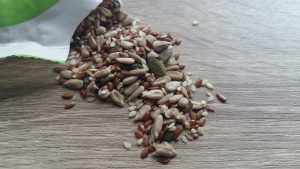 While omega 6’s are important, they tend to overshadow the importance of omega 3’s. It’s the role of omega 3 to lower inflammation and increase healing. Not only that, flaxseeds can even reduce the size of cancer cells in the male prostate.
While omega 6’s are important, they tend to overshadow the importance of omega 3’s. It’s the role of omega 3 to lower inflammation and increase healing. Not only that, flaxseeds can even reduce the size of cancer cells in the male prostate.
Furthermore, omega 3’s from food sources such as flaxseeds, walnuts, and edamame beans have been linked to increased blood and oxygen supply around the body – helping to shuttle more nutrients into damaged muscles.
However, the downside to using omega 3’s from plant sources is the poor conversion of alpha-linolenic acid ALA into DHA and EPA. We need the necessary docosahexaenoic acid (DHA) and eicosapentaenoic acid (EPA) to prevent heart disease while lowering blood pressure. (III)
Therefore, it’s important to supplement with numerous plant sources of omega 3’s to maintain health and recovery if you are a vegan/vegetarian. Another option is to look into microalgae, which is a form of algae high in omega 3.
(08) Dark chocolate
 Dark chocolate, much like green tea, tart cherries, and beetroot, contains high amounts of antioxidants that speed up recovery. It’s the polyphenols and anthocyanins in dark chocolate that are thought to increase muscular repair at a heightened rate.
Dark chocolate, much like green tea, tart cherries, and beetroot, contains high amounts of antioxidants that speed up recovery. It’s the polyphenols and anthocyanins in dark chocolate that are thought to increase muscular repair at a heightened rate.
Just one word of caution when buying dark chocolate, look for at least 70-90% cocoa content with minimal sugar. There’s no use in undoing all of your hard work by eating milk chocolate packed with artificial ingredients.
(09) Pumpkin Seeds – (Mg)
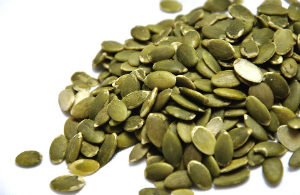 If you’ve ever laid awake at night after a hard session, where you’re struggling to sleep, it could be due to low magnesium levels.
If you’ve ever laid awake at night after a hard session, where you’re struggling to sleep, it could be due to low magnesium levels.
Not only that, if you’ve ever felt your arms or leg muscles twitching, this my friend, could be down to a depletion of magnesium. Pumpkin seeds are packed full of this essential mineral.
On top of this, pumpkin seeds contain healthy amounts of omega 3 fats and zinc. And if you’re a man, zinc is something that you really want to pay attention to. It’s zinc’s role to increase testosterone production, helping you to increase muscle growth and repair.
Read more on: Does Magnesium Help Muscle Recovery?
(10) Coconut
 Coconut is packed full of an essential mineral that without it, we simply wouldn’t be able to function at our best, and that’s potassium. Potassium is responsible for balancing our sodium levels while increasing our time to exhaustion during exercise.
Coconut is packed full of an essential mineral that without it, we simply wouldn’t be able to function at our best, and that’s potassium. Potassium is responsible for balancing our sodium levels while increasing our time to exhaustion during exercise.
Being able to balance our electrolyte levels will enable our body to shuttle more nutrients into our damaged muscles post-exercise.
When our electrolytes are out of balance, our blood pressure will either drop or rise. Therefore, essential minerals such as magnesium won’t be able to do their job efficiently in energy metabolism.
Furthermore, coconut (i.e. potassium) helps your body to increase its absorption and the balance of other minerals that are key to maintaining adequate hydration levels.
Read more on: The Benefits of Using Coconut For Performance and Recovery
Therefore, eating the right mineral containing foods such as coconut during intense workouts, and especially after, will increase the way you feel both physically and mentally.
(11) Sodium
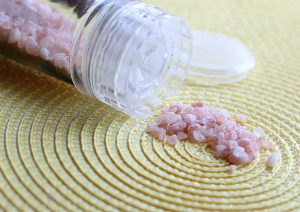 When you take part in any type of exercise, whether that’s an intense HIIT weight session or a walk in the park, you will inevitably lose some minerals via perspiration. Salt is one of those minerals.
When you take part in any type of exercise, whether that’s an intense HIIT weight session or a walk in the park, you will inevitably lose some minerals via perspiration. Salt is one of those minerals.
Salt is responsible for improving blood and oxygen circulation, along with shuttling more nutrients such as leucine into damaged muscles post-exercise.
Not only that, but salt can also prevent fatal conditions such as hyponatremia, which is the depletion of sodium in the bloodstream – leading to brain damage and even death in some cases.
Choosing Himalayan rock salt, or any other organic natural salt is the best option. This is because they contain numerous trace minerals. For example; Hydrogen, Iron, Zinc, Manganese, Chromium and Magnesium.
Final Thoughts!
By following these nutrition tips, and by adding these foods into your diet surrounding your workouts, you’ll be sure to notice a big difference in the way you feel, and subsequently, the way you perform.
As we’ve already discussed, the recovery process is complex in nature. How well you recover will all depend on your sleep, external stressors from everyday life, and your current levels of conditioning.
However, nutrition is emerging as one of the main factors in how well we as athletes can improve our mental and physical fitness. So, paying close attention to what you eat is a must for any athlete!
For those of you who are new to sports nutrition, my advice is to take adopt at least one healthy habit each week. And before you know it, you’ll have created a foundation of recovery tactics that will help to speed up your rate of healing by leaps and bounds.
Resources:
(I) Hansen, Ernst Albin, et al. “Improved Marathon Performance by in-Race Nutritional Strategy Intervention.” International Journal of Sport Nutrition and Exercise Metabolism, U.S. National Library of Medicine, Dec. 2014. (source)
(II) Ornish, Dean, et al. “Changes in Prostate Gene Expression in Men Undergoing an Intensive Nutrition and Lifestyle Intervention.” Proceedings of the National Academy of Sciences of the United States of America, National Academy of Sciences, 17 June 2008. (source)
(III) Cholewski, Mateusz, et al. “A Comprehensive Review of Chemistry, Sources and Bioavailability of Omega-3 Fatty Acids.” Nutrients, MDPI, 4 Nov. 2018. (source)

Leave a Reply